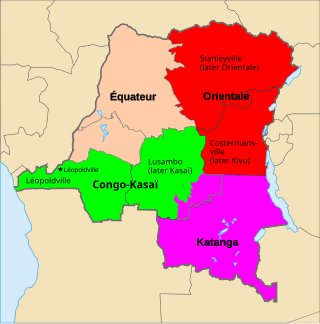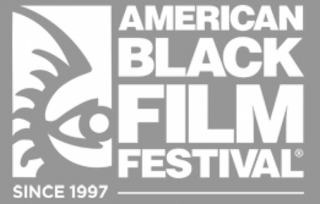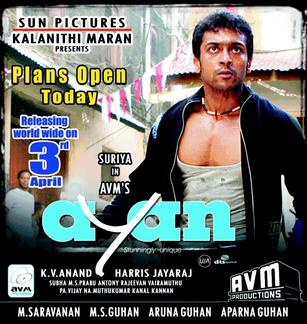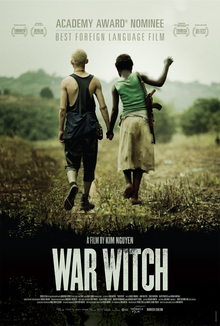Related Research Articles

Katanga was one of the four large provinces created in the Belgian Congo in 1914. It was one of the eleven provinces of the Democratic Republic of the Congo between 1966 and 2015, when it was split into the Tanganyika, Haut-Lomami, Lualaba, and Haut-Katanga provinces. Between 1971 and 1997, its official name was Shaba Province.

The Democratic Republic of the Congo is a country in Central Africa. By land area, the DRC is the second-largest country in Africa and the 11th-largest in the world. With a population of around 105 million, the Democratic Republic of the Congo is the most populous Francophone country in the world. The national capital and largest city is Kinshasa, which is also the economic center. The country is bordered by the Republic of the Congo, Central African Republic, South Sudan, Uganda, Rwanda, Burundi, Tanzania, Zambia, Angola, the Cabinda exclave of Angola, and the South Atlantic Ocean.

Daniel Francis Boyle is an English director and producer. He is known for his work on films including Shallow Grave, Trainspotting and its sequel T2 Trainspotting, The Beach, 28 Days Later, Sunshine, Slumdog Millionaire, 127 Hours, Steve Jobs, and Yesterday.

Malayalam cinema is the segment of Indian cinema dedicated to the production of motion pictures in the Malayalam language, which is widely spoken in the state of Kerala, India. In 1982, Elippathayam won the Sutherland Trophy at the London Film Festival, and Most Original Imaginative Film of 1982 by the British Film Institute. The film Marana Simhasanam has won the prestigious Caméra d'Or at the 1999 Cannes Film Festival.

The Second Congo War, also known as Africa's World War or the Great War of Africa or the Great African War, began in the Democratic Republic of the Congo in August 1998, little more than a year after the First Congo War, and involved some of the same issues.

The cinema of Nigeria, often referred to informally as Nollywood, consists of films produced in Nigeria; its history dates back to as early as the late 19th century and into the colonial era in the early 20th century. The history and development of the Nigerian motion picture industry is sometimes generally classified in four main eras: the Colonial era, Golden Age era, Video film era and the emerging New Nigerian cinema era.
The São Tomé and Príncipe national football team is the national association football team of São Tomé and Príncipe and is controlled by the São Toméan Football Federation. It is a member of the Confederation of African Football (CAF) and FIFA.

The Panafrican Film and Television Festival of Ouagadougou is a film festival in Burkina Faso, held biennially in Ouagadougou, where the organization is based. It accepts for competition only films by African filmmakers and chiefly produced in Africa. FESPACO is scheduled in March every second year, two weeks after the last Saturday of February. Its opening night is held in the Stade du 4-Août, the national stadium.

Cinema of Africa covers both the history and present of the making or screening of films on the African continent, and also refers to the persons involved in this form of audiovisual culture. It dates back to the early 20th century, when film reels were the primary cinematic technology in use. During the colonial era, African life was shown only by the work of white, colonial, Western filmmakers, who depicted Africans in a negative fashion, as exotic "others". As there are more than 50 countries with audiovisual traditions, there is no one single 'African cinema'. Both historically and culturally, there are major regional differences between North African and sub-Saharan cinemas, and between the cinemas of different countries.

The American Black Film Festival (ABFF), originally called the Acalpulco Black Film Festival, is an independent film festival that focuses primarily on black film and works by black members of the film industry. The festival is held annually in Miami, Florida and features films, documentaries, and web series with black writers, directors, and actors.
Sambizanga is a 1972 film directed by Sarah Maldoror and written by Maldoror, Mário Pinto de Andrade, and Maurice Pons, based on the 1961 novella The Real Life of Domingos Xavier by José Luandino Vieira. Set in 1961 during the onset of the Angolan War of Independence, it follows the struggles of Angolan militants involved with the Popular Movement for the Liberation of Angola (MPLA), an anti-colonial political movement. Maldoror co-wrote the screenplay with her husband, who was a leader within the MPLA. Sambizanga was the first feature film produced by a Lusophone African country.

Ayan (transl. Creator) is a 2009 Indian Tamil-language action film directed by K. V. Anand and produced by M. Saravanan and M. S. Guhan. The film, starring Suriya, Prabhu, Tamannaah Bhatia, Akashdeep Saighal, Jagan, and Karunas. The film score and soundtrack was composed by Harris Jayaraj, edited by Anthony Gonsalvez, the film was filmed by M. S. Prabhu.

The Republic of the Congo is a country located on the western coast of Central Africa to the west of the Congo River. It is bordered to the west by Gabon, to the northwest by Cameroon, to the northeast by the Central African Republic, to the southeast by the Democratic Republic of the Congo, to the south by the Angolan exclave of Cabinda, and to the southwest by the Atlantic Ocean.

War Witch is a 2012 Canadian dramatic war film written and directed by Kim Nguyen and starring Rachel Mwanza, Alain Lino Mic Eli Bastien and Serge Kanyinda. It is about a child soldier forced into a civil war in Africa, and who is believed to be a witch. The film was primarily shot in the Democratic Republic of the Congo in French and Lingala.

Kony 2012 is a 2012 American short documentary film produced by Invisible Children, Inc. The film's purpose was to make Ugandan cult leader, war criminal, and ICC fugitive Joseph Kony globally known so as to have him arrested by the end of 2012. The film was released on March 5, 2012, and spread virally, and the campaign was initially supported by various celebrities.
Congo in Four Acts is a 2010 documentary film.
Le Congo, quel cinéma! is a 2005 documentary film directed by Guy Bomanyama-Zandu.
Cinema of the Democratic Republic of the Congo originated with educational and propaganda films during the colonial era of the Belgian Congo. Development of a local film industry after the Democratic Republic of the Congo gained its independence from Belgium in 1960, and was handicapped by constant civil war.

Thierry Michel is a Belgian film director, mostly making social and political documentaries. His office and company Les films de la passerelle is located in Liège, where he works with the producer Christine Pireaux. Over a twenty-year period he has made a series of documentaries on different aspects of Zaire . Taken together his films provide a unique overview of the social, economic and political life of the country.

New Nigerian Cinema or New Nigerian Cinema era is an emerging phase in Nigerian cinema, in which there became a major shift in the method of film production, from the video format, which came about during the video boom, back to the cinema method, which constituted the films produced in the Golden era of Nigerian cinema history. The films in the New Wave are specifically characterized by improved narrative complexity, aesthetic nuance, much higher budgets and advanced overall production values, when compared to video films from the second generation of filmmakers. They are mostly released theatrically, although some are still released directly on DVD.
References
- African Film Festival of Cordoba-FCAT (license CC BY-SA-3.0)
- ↑ "HW Weekend Picks: Black History Month At Maysles". Harlem World Magazine. 4 February 2011. Archived from the original on 25 January 2013. Retrieved 11 March 2012.
- ↑ "Portrait : le cinéaste congolais Petna Ndaliko ou l'ambassadeur de la réunification en pellicule". Digital Congo (in French). Kinshasa. 12 August 2005. Archived from the original on 22 June 2010. Retrieved 11 March 2012.
- ↑ "Event details". Break The Silence Congo Week. Retrieved 11 March 2012.